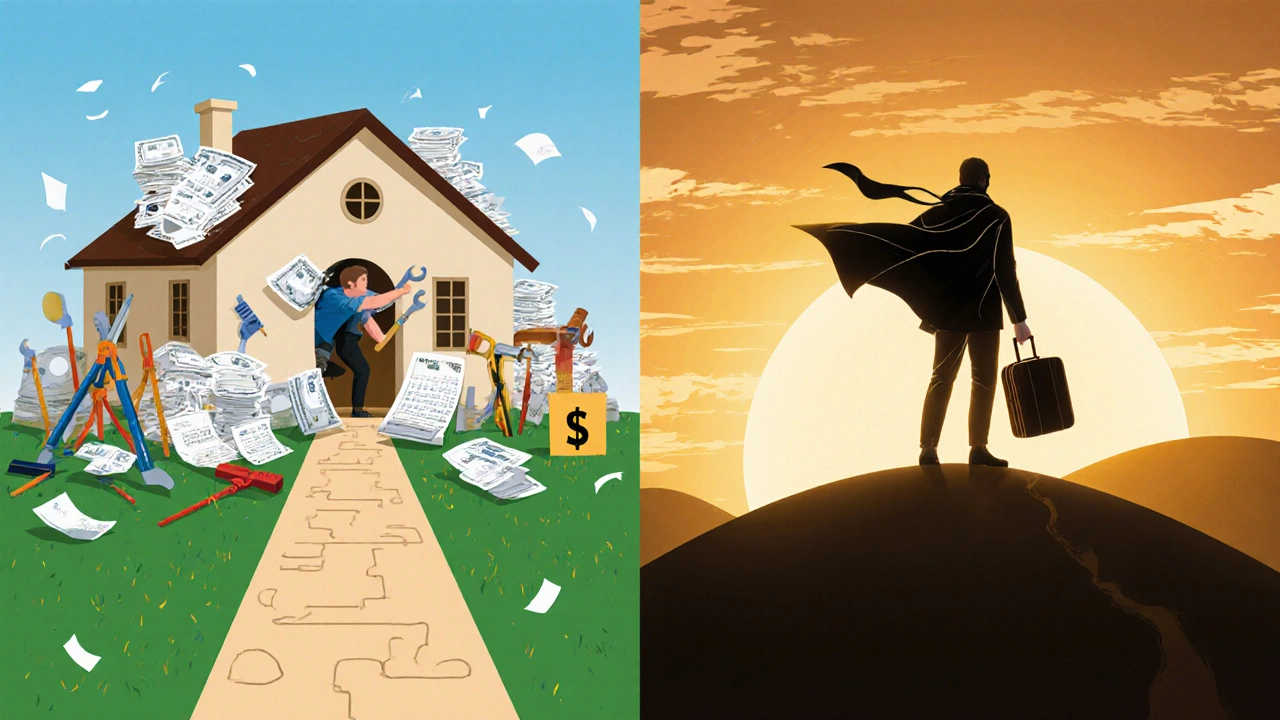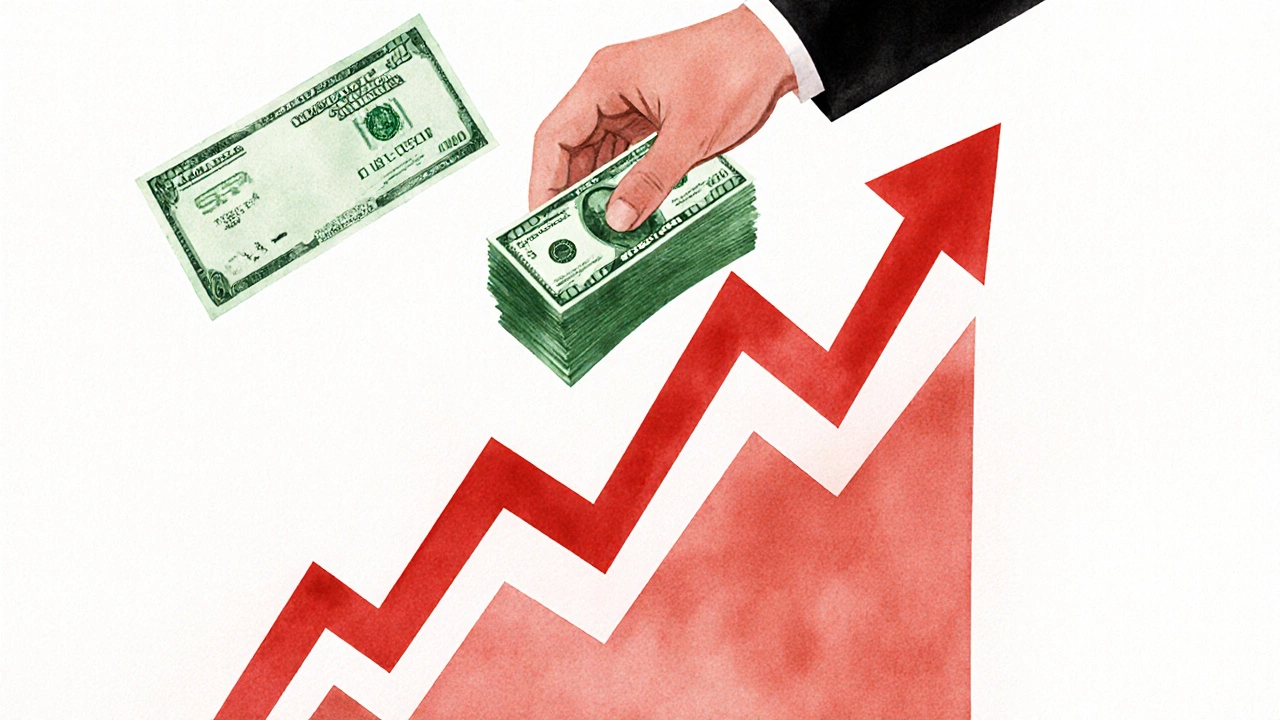Is renting really throwing money away? The truth about rent vs. buy

Nov, 16 2025
Rent vs. Buy Calculator
Compare Your Options
Results will appear here after calculation
Everyone’s heard it: "Renting is throwing money away." It’s said like it’s a law of nature, something you’re stupid for not avoiding. But what if that’s not true? What if the real waste isn’t rent-it’s buying a home you can’t afford, can’t move from, or don’t even want to live in for five years?
Why people think rent is wasted money
The logic is simple: When you pay rent, you don’t own anything. When you pay a mortgage, you’re building equity. That’s the story. And it works-if you stay put, if prices go up, if you never need to move, and if you never face a repair bill that costs half your paycheck.In 2024, the average U.S. renter paid $1,850 a month. A homeowner with a 30-year fixed mortgage at 6.5% interest on a $400,000 home pays about $2,500 a month-plus property taxes, insurance, and maintenance. That’s $700 more per month, on average, just to own. And that’s before the $12,000 you might spend fixing a leaky roof or replacing a broken HVAC system.
Here’s the catch: The $700 extra you pay as a homeowner isn’t always going into your pocket. It’s going into a house that might not appreciate. In 2023, 42% of U.S. metro areas saw home prices drop or flatline. In cities like Detroit, Cleveland, and St. Louis, home values haven’t meaningfully risen in over a decade. If you bought there, you didn’t build equity-you just paid more to live in the same place.
What renting actually buys you
Renting isn’t just paying for a roof. It’s paying for flexibility, time, and freedom.Take Sarah, 32, who moved from Chicago to Austin for a job in tech. She rented for three years. When her contract ended, she moved to Denver for a better role. She didn’t have to sell a house, deal with showings, or lose thousands in closing costs. She packed her bags and left. Her landlord handled the roof, the plumbing, the pest control. She spent $2,100 a month on rent. She saved $1,500 a month in a high-yield account. By year three, she had $54,000 in cash-enough to buy a home outright in some parts of the country.
That’s the hidden advantage of renting: you’re not tied to one asset. You can move for opportunity. You can wait for the right market. You can avoid buying when prices are inflated. In 2022, when home prices spiked 20% in a year, renters didn’t panic. They kept saving. Buyers got stuck.
The hidden costs of homeownership
Most people forget that owning a home isn’t just about the mortgage. It’s a whole other job.According to a 2024 study by the National Association of Realtors, the average homeowner spends $1,200 a year on maintenance alone. That’s $100 a month. Add property taxes ($200-$500/month depending on location), insurance ($50-$150), and HOA fees ($100-$300), and you’re looking at $500-$1,000 extra per month on top of your mortgage.
And then there’s the opportunity cost. That $50,000 you put down on a house? If you’d invested it in the S&P 500 over the last 10 years, it would’ve grown to about $110,000. That’s not speculation-it’s historical data. The S&P returned 12.5% annually on average from 2015 to 2025. Home prices? 5.8%.
Homeownership isn’t a guaranteed investment. It’s a bet. And most people don’t realize they’re betting their entire life on it.

When renting makes more sense
You’re better off renting if:- You plan to move in less than five years
- You work in a volatile industry (tech, gig economy, sales)
- You live in a city with high home prices and low rental yields (like San Francisco or New York)
- You can’t afford a 20% down payment without draining your emergency fund
- You’re not the type to mow lawns, unclog drains, or deal with noisy neighbors
In 2025, the average homebuyer spends 7 months looking. That’s 210 days of stress, open houses, bidding wars, and inspections. Renters? They find a place in a week. Sign a lease. Move in. Done.
And let’s not forget: renting lets you live where you want. In Denver, you can rent a 3-bedroom townhouse for $2,800. Buy the same one? You’ll need $650,000. That’s a $150,000 difference in down payment alone. That’s enough to pay off student loans, start a business, or fund a year of travel.
When buying still wins
That doesn’t mean buying is bad. It’s just not always the right move.Buying makes sense if:
- You plan to live in the home for 7+ years
- You’re in a market with stable or rising prices (think Austin, Raleigh, Nashville)
- You can afford the full cost-mortgage, taxes, insurance, maintenance, and repairs-with room to spare
- You want the stability of fixed housing costs (no rent hikes)
- You’re okay being a landlord to your own property
And here’s the thing: if you buy, you should treat it like an investment. That means not spending your equity on new furniture or a vacation. It means keeping your home in good shape. It means understanding that you’re not just buying a place to live-you’re buying a long-term financial commitment.

The real question isn’t rent vs. buy. It’s freedom vs. control.
Renting gives you freedom. You can leave. You can change your life. You can save and invest elsewhere.Buying gives you control. You can paint the walls. You can build a deck. You can lock in your housing cost. But you also get stuck.
One person’s "wasted money" is another person’s freedom fund. One person’s "smart investment" is another’s financial trap.
There’s no universal answer. Only your answer.
Ask yourself: Do I want to own a house-or do I want to own my life?
What renters should do instead
If you’re renting, don’t just accept it as a cost. Turn it into a strategy.- Save at least 30% of what you’d pay in mortgage + taxes + insurance
- Invest in low-cost index funds (S&P 500, total market)
- Build an emergency fund that covers 6 months of rent
- Track your local housing market. If prices drop 15%, consider buying
- Use apps like Zillow or Redfin to compare rent vs. buy in your city
In 2025, cities like Phoenix, Tampa, and Atlanta show that renting and investing can outperform buying-if you’re disciplined. One study found that renters who saved 30% of their housing budget and invested it grew their net worth 22% faster than homeowners who didn’t invest extra.
Bottom line: Renting isn’t throwing money away. It’s choosing where to spend it.
Renting isn’t the problem. The problem is believing you have to buy to be financially responsible.You can be a responsible adult and rent. You can be a smart investor and rent. You can build wealth and rent.
The myth that rent is wasted money ignores reality: housing isn’t a one-size-fits-all investment. It’s a lifestyle choice. And the best choice isn’t the one everyone says you should make. It’s the one that fits your life, your goals, and your freedom.
Is it really cheaper to rent than buy?
It depends. In high-cost cities like San Francisco or Boston, renting is almost always cheaper than buying when you factor in taxes, insurance, and maintenance. In affordable markets like Cincinnati or Kansas City, buying can be cheaper after 5-7 years. Use a rent-vs-buy calculator that includes all costs-not just mortgage payments.
How long should I rent before buying?
Most financial experts say wait at least 5 years before buying, unless you’re in a stable market with low prices. If you plan to move sooner, renting saves you thousands in closing costs, realtor fees, and potential price drops. The break-even point is usually 4-7 years, depending on your location and down payment.
Can I build wealth while renting?
Absolutely. Renters who invest the difference between rent and mortgage payments into index funds often outperform homeowners who don’t invest extra. The key is discipline: save 25-30% of what you’d spend on homeownership and invest it consistently. Over 10 years, that can grow into $100,000+.
What if home prices keep rising?
Rising prices don’t make renting a bad choice-they make timing important. If prices are rising fast, you’re better off saving now to buy later when prices cool. History shows housing markets correct. In 2023, over 40 U.S. markets saw price drops. Renters who waited bought at lower prices and avoided the peak.
Should I rent forever?
There’s no rule that says you must buy. Many people rent for life-especially in cities with high costs or unstable job markets. If you’re financially secure, have good savings, and value flexibility, renting isn’t a failure. It’s a strategy. Owning a home isn’t the only path to security.